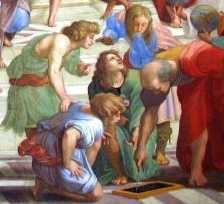The dawn now sprinkles the sky
terris dies illábitur:
the day flows over the earth
lucis resúltat spículum:
the rays of light mount on high
discédat omne lúbricum.
Let all deceit depart
THE DAWN is sprinkling in the east
its golden shower, as day flows in;
fast mount the pointed shafts of light:
farewell to darkness and to sin!
Iam vana noctis décidant,
Now let the vain things of night pass away
mentis reátus súbruat,
let guilt of soul depart
quicquid tenébris hórridum
whatever frightful thing of darkness
nox áttulit culpae, cadat,
the night has brought of guilt, let it fall,
Away, ye midnight phantoms all!
Away, despondence and despair!
Whatever guilt the night has brought
now let it vanish into air.
Ut mane illud últimum
So that on that last morning
quod praestolámur cérnui,
which we await bowing
in lucem nobis éffluat,
in light to us may it flow
dum hoc canóre cóncrepat.
while this song sounds on.
So, Lord, when that last morning breaks,
looking to which we sigh and pray,
O may it to Thy minstrels prove
the dawning of a better day.
Deo Patri sit glória,
eiúsque soli Fílio,
cum Spíritu Paráclito,
in sempitérna saécula. Amen.
To God the Father glory be,
and to His sole-begotten Son;
Glory, O Holy Ghost, to Thee,
while everlasting ages run. Amen.
Attributed to St. Ambrose (350-397).
Translation by Fr. Edward Caswall (1814-1878).
I like this metric translation today. Once again, St. Ambrose of Milan probably did not write this hymn, it is just written in his style (see yesterday's post.)
Fr. Britt, on page 72 of his book on Hymns of the Breviary, has the following analysis of the third stanza:
"That on that last morning, together with the light, that which we here humbly
pray for, and what accords with our song, may issue forth (come) to us."
Constr.: Ut cum luce (æterna) mane (illud) untimum nobis effluat, quod nos
hic, dum hoc canore concrepat, deprecamur ceruni. THis stanza is very
obscure. It seems to contain a reference to the present morning, and to the last
morning--at the end of time. In this sense it might be rendered: "While the
present morning resounds with song (canore), we here with profound
humility beg (deprecamur cernui) that the last morning may also dawn
(effluat) for us with light eternal." Abp. Bagshawe translates mane
ultimum as referring to Saturday--"On this morn of the week the last." The
following is from an anonymous translation in the Hymnal Noted:
So that last morning dread and great,
Which we with trembling hope await,
With blessed light for us shall glow,
Who chant the song we sang below.

No comments:
Post a Comment